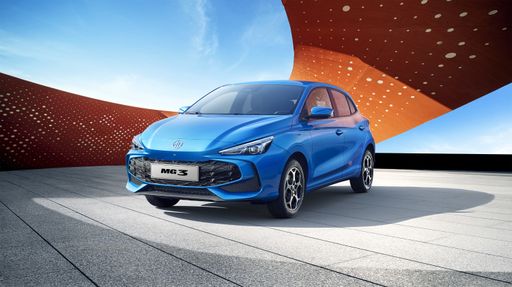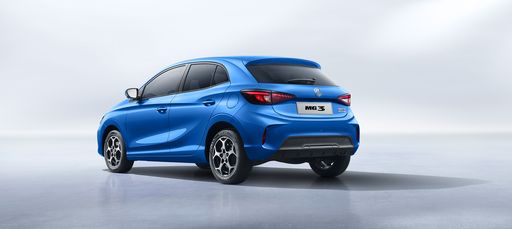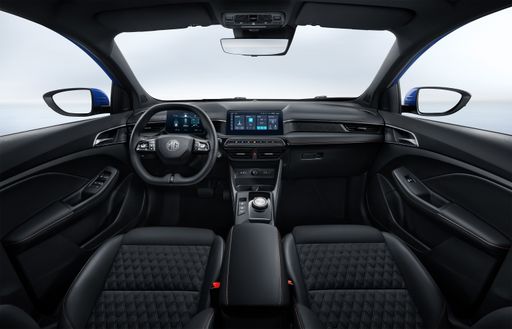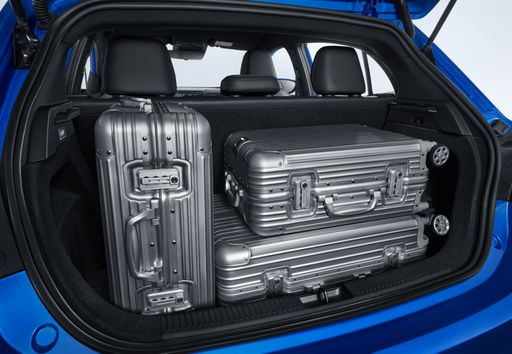In the ever-competitive hatchback segment, the Hyundai i20 and MG MG3 emerge as two formidable contenders for buyers seeking functionality blended with modern technology and style. In this comparison, we examine their technical aspects, innovations, and overall value to help potential buyers make an informed decision.
Hyundai i20 vs MG MG3 - Differences and prices compared
Compare performance (90 HP vs 194 HP), boot space and price (18600 £ vs 15400 £ ) at a glance. Find out which car is the better choice for you – Hyundai i20 or MG MG3?
Pricing and Variants
The Hyundai i20 carries a price range from €19,900 to €27,600, depending on the variant chosen. It is offered in several configurations, including both automatic and manual transmissions across its petrol and petrol MHEV (mild hybrid) engine types.
On the other hand, the MG MG3 is positioned as a more budget-friendly option with prices ranging from €19,990 to €23,990. This model comes exclusively with an automatic gearbox and features a full hybrid engine.
Performance and Powertrain
The Hyundai i20's power options include two engines with configurations of 1.0L MHEV, which produces 100 HP and offers an impressive torque of 200 Nm, making it suitable for urban commutes as well as longer journeys. The i20 accelerates from 0-100 km/h in between 11.1 to 12.1 seconds based on the engine variant chosen.
In comparison, the MG3 boasts a more powerful 1.5L engine delivering 194 HP and 143 kW of power with a torque rating of 194 Nm. This allows for a significantly quicker acceleration time of just 8 seconds from 0-100 km/h. However, this performance comes at the cost of a lower maximum speed of 170 km/h compared to the i20's top speed of 182 km/h.
Fuel Economy and Emissions
When it comes to fuel efficiency, the MG3 shines, with a consumption figure of just 4.4 L/100 km, leading to lower CO2 emissions of 100 g/km, which grants it a CO2 Efficiency Class C rating. This means it may attract environmentally conscious buyers looking to minimize their carbon footprint.
The Hyundai i20, while a bit thirstier with a consumption of 5.1 to 5.3 L/100 km, still achieves respectable CO2 emissions of 117 to 120 g/km and holds a CO2 Efficiency Class D certification. Both vehicles are equipped with a front-wheel-drive configuration, ensuring adequate handling and performance on various road conditions.
Dimensions and Practicality
In terms of space, the Hyundai i20 is slightly more compact, measuring 4075 mm in length, 1775 mm in width, and 1455 mm in height. This car provides ample trunk capacity of 352 liters, making it practical for everyday use. With a curb weight of up to 1190 kg and a payload capacity of up to 472 kg, the i20 ensures a robust driving experience.
The MG3, being a tad larger at 4113 mm in length and 1797 mm in width, provides a trunk capacity of 293 liters, which is slightly less than that of the i20. However, this model has a higher curb weight of 1285 kg, which could affect its agility and efficiency.
Interior and Innovations
When it comes to interior technology and comfort, both vehicles cater to the needs of modern drivers. The Hyundai i20 is equipped with the latest infotainment system including features such as smartphone connectivity, navigation, and comprehensive driver-assistance technologies that enhance safety and convenience.
The MG3 also delivers a user-friendly infotainment interface but lacks some of the high-end safety features found in the i20. Synthetic materials and practical interior layouts characterize both vehicles, ensuring comfort for up to five passengers.
Final Verdict
Both the Hyundai i20 and MG MG3 have their unique strengths. The i20 stands out with its comprehensive range of engine options, better performance metrics, and a more spacious trunk capacity, making it an excellent choice for buyers valuing practicality and drive experience.
Conversely, the MG3 offers a compelling value proposition with its budget-friendly pricing, high power output and excellent fuel economy, making it an attractive option for those looking for performance at a lower price point.
Ultimately, your choice may hinge on personal preferences regarding performance versus cost efficiency and technological features. Each model presents a compelling case in the hatchback market, thus making either a worthy contender for your next vehicle.
Here’s where it gets real: The technical differences in detail
Costs and Efficiency:
Price and efficiency are key factors when choosing a car – and this is often where the real differences emerge.
MG MG3 has a noticeable advantage in terms of price – it starts at 15400 £ , while the Hyundai i20 costs 18600 £ . That’s a price difference of around 3180 £.
Fuel consumption also shows a difference: MG MG3 manages with 4.40 L and is therefore clearly perceptible more efficient than the Hyundai i20 with 5.70 L. The difference is about 1.30 L per 100 km.
Engine and Performance:
Under the bonnet, it becomes clear which model is tuned for sportiness and which one takes the lead when you hit the accelerator.
When it comes to engine power, the MG MG3 has a significantly edge – offering 194 HP compared to 90 HP. That’s roughly 104 HP more horsepower.
In acceleration from 0 to 100 km/h, the MG MG3 is convincingly quicker – completing the sprint in 8 s, while the Hyundai i20 takes 11.50 s. That’s about 3.50 s faster.
There’s also a difference in torque: Hyundai i20 pulls a bit stronger with 172 Nm compared to 148 Nm. That’s about 24 Nm difference.
Space and Everyday Use:
Whether family car or daily driver – which one offers more room, flexibility and comfort?
Both vehicles offer seating for 5 people.
In curb weight, Hyundai i20 is hardly perceptible lighter – 1145 kg compared to 1237 kg. The difference is around 92 kg.
In terms of boot space, the Hyundai i20 offers slightly more room – 352 L compared to 293 L. That’s a difference of about 59 L.
When it comes to payload, Hyundai i20 hardly perceptible takes the win – 465 kg compared to 448 kg. That’s a difference of about 17 kg.
Who wins the race in the data check?
The MG MG3 holds a decisive overall lead in the objective data comparison.
This result only shows which model scores more points on paper – not which of the two cars feels right for you.
Costs and Consumption
View detailed analysis
Engine and Performance
View detailed analysis
Dimensions and Body
View detailed analysis

MG MG3
Hyundai i20
The Hyundai i20 is a cheeky small car that mixes smart styling with sensible practicality, feeling more polished and roomy than you might expect for the money. It’s an easy car to live with, offering engaging handling, a comfy cabin and useful equipment that make daily commutes and weekend errands notably less dull.
details




MG MG3
The MG3 is a cheeky city hatch that pairs bold, youthful styling with sprightly handling for drivers who want personality on a budget. Its cabin is bright and cleverly packaged, offering sensible space and a fun-to-drive character that turns mundane commutes into something a bit more enjoyable.
details



Costs and Consumption |
|
|---|---|
|
Price
18600 - 24000 £
|
Price
15400 - 21400 £
|
|
Consumption L/100km
5.70 L
|
Consumption L/100km
4.4 - 6.1 L
|
|
Consumption kWh/100km
-
|
Consumption kWh/100km
-
|
|
Electric Range
-
|
Electric Range
-
|
|
Battery Capacity
-
|
Battery Capacity
-
|
|
co2
128 - 129 g/km
|
co2
100 - 137 g/km
|
|
Fuel tank capacity
-
|
Fuel tank capacity
36 L
|
Dimensions and Body |
|
|---|---|
|
Body Type
Hatchback
|
Body Type
Hatchback
|
|
Seats
5
|
Seats
5
|
|
Doors
-
|
Doors
5
|
|
Curb weight
1145 - 1170 kg
|
Curb weight
1237 - 1285 kg
|
|
Trunk capacity
352 L
|
Trunk capacity
293 L
|
|
Length
-
|
Length
4113 mm
|
|
Width
1775 mm
|
Width
1797 mm
|
|
Height
-
|
Height
1502 mm
|
|
Max trunk capacity
-
|
Max trunk capacity
983 L
|
|
Payload
455 - 465 kg
|
Payload
373 - 448 kg
|
Engine and Performance |
|
|---|---|
|
Engine Type
Petrol
|
Engine Type
Full Hybrid, Petrol
|
|
Transmission
Manuel, Automatic
|
Transmission
Automatic, Manuel
|
|
Transmission Detail
Manual Gearbox, Dual-Clutch Automatic
|
Transmission Detail
Automatic Gearbox, Manual Gearbox
|
|
Drive Type
Front-Wheel Drive
|
Drive Type
Front-Wheel Drive
|
|
Power HP
90 HP
|
Power HP
116 - 194 HP
|
|
Acceleration 0-100km/h
11.5 - 12.8 s
|
Acceleration 0-100km/h
8 - 10.8 s
|
|
Max Speed
-
|
Max Speed
170 km/h
|
|
Torque
172 Nm
|
Torque
148 Nm
|
|
Number of Cylinders
3
|
Number of Cylinders
4
|
|
Power kW
66 kW
|
Power kW
85 - 143 kW
|
|
Engine capacity
998 cm3
|
Engine capacity
1490 - 1495 cm3
|
General |
|
|---|---|
|
Model Year
2025
|
Model Year
2024 - 2025
|
|
CO2 Efficiency Class
D
|
CO2 Efficiency Class
C, E
|
|
Brand
Hyundai
|
Brand
MG
|
What drivetrain options does the Hyundai i20 have?
The Hyundai i20 is offered with Front-Wheel Drive.
